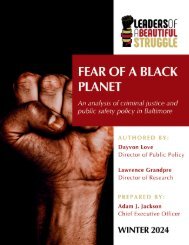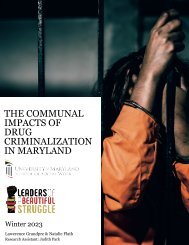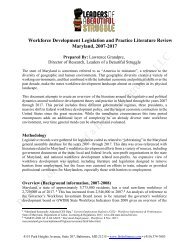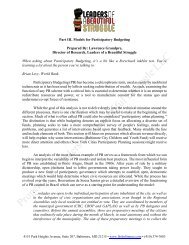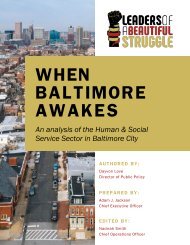Drug Decriminalization in Maryland Through an African Centered Research Paradigm- Analysis and Recommendations
This document offers guidance for theorizing questions related to a proposed research project purposed to advance drug decriminalization in Maryland.
This document offers guidance for theorizing questions related to a proposed research project purposed to advance drug decriminalization in Maryland.
- No tags were found...
Create successful ePaper yourself
Turn your PDF publications into a flip-book with our unique Google optimized e-Paper software.
are value laden is the belief that objectivity is <strong>an</strong> illusion (Akbar,1984; Ani, 1994). It is<br />
believed to be illusionary because Afrocentricity disagrees with the notion of<br />
objectification, the belief that the knower should, <strong>an</strong>d c<strong>an</strong>, emotionally detach himself or<br />
herself from that which he or she is attempt<strong>in</strong>g to know—even if the targeted entities are<br />
hum<strong>an</strong>s <strong>an</strong>d their social environments. This, of course, nurtures the well-discussed<br />
"subject/object" duality. From <strong>an</strong> Afrocentric viewpo<strong>in</strong>t, this duality is <strong>in</strong>appropriate<br />
because "<strong>in</strong> the pure Afric<strong>an</strong>ized worldview of the unity of [people] <strong>an</strong>d the phenomenal<br />
world, there is no empty perceptual space between the self <strong>an</strong>d phenomena" (Dixon, 1976,<br />
p. 70). Further, this duality fosters <strong>an</strong>d re<strong>in</strong>forces a process of know<strong>in</strong>g that is sterile <strong>an</strong>d<br />
<strong>in</strong>complete.” (Schiele, 2000).<br />
Schiele argues the those who attempt to resurrect the notion of scientific objectivity confuse the<br />
perceived ability to detach their emotions from research <strong>an</strong>d focus on data as proof of their<br />
objectivity, where <strong>in</strong> reality their belief that they c<strong>an</strong> separate themselves from the world around<br />
them is <strong>an</strong> illusion <strong>an</strong>d fundamentally misconstrues the ability of the subject to exist outside of the<br />
world, <strong>an</strong>d other people. The idea of the th<strong>in</strong>k<strong>in</strong>g subject to be able to tr<strong>an</strong>scend the <strong>in</strong>fluences of<br />
the world, to create themselves as <strong>an</strong> autonomous be<strong>in</strong>g of pure logic, goes back to the famous<br />
statement of philosopher Rene Descartes “I th<strong>in</strong>k therefore I am.” Scholars of Afric<strong>an</strong> descent have<br />
often countered this view of rational, autonomous subjectivity with a notion of collective subject,<br />
with the hum<strong>an</strong> subject com<strong>in</strong>g <strong>in</strong>to be<strong>in</strong>g through their reciprocal relationships with others, often<br />
expressed through the notion of “Ubuntu” <strong>an</strong>d the phrase “I am because we are”. This seem<strong>in</strong>gly<br />
academic dist<strong>in</strong>ction reflects a deep divide between two different systems of thought, with the<br />
AARP challeng<strong>in</strong>g the researcher's ability to separate themselves from their research <strong>an</strong>d forc<strong>in</strong>g<br />
them to take accountability for how their research <strong>in</strong>teracts with the world.<br />
This is import<strong>an</strong>t because the critical 4th stage of Akbar’s AARP, heuristic research,<br />
suggests that research f<strong>in</strong>d<strong>in</strong>gs should be applied to make recommendations for what should be<br />
done to materially improve conditions for the oppressed. While the dom<strong>in</strong><strong>an</strong>t vision of research<br />
views knowledge <strong>in</strong> <strong>an</strong>d of itself as a laudable goal <strong>an</strong>d seeks to turn research f<strong>in</strong>d<strong>in</strong>gs <strong>in</strong>to grist<br />
for the mill of scientific progress (i.e., more research), the AARP says explicitly research f<strong>in</strong>d<strong>in</strong>gs<br />
should be used to recommend ch<strong>an</strong>ges to the world. This is often seen as outside the scope of the<br />
academic’s role, which is to produce knowledge that others may use to recommend political<br />
<strong>in</strong>terventions, but to be <strong>in</strong>volved directly <strong>in</strong> advocat<strong>in</strong>g policy ch<strong>an</strong>ges would violate scientific<br />
notions of “objectivity.” AARP recognizes that objectivity <strong>an</strong>d the notion that the researcher<br />
should be morally separated from the applications <strong>an</strong>d ramifications of their research is false <strong>an</strong>d<br />
obscures the responsibility the researcher has to use research as a tool to address the material<br />
conditions of oppression. This is not to say em<strong>an</strong>cipatory research has the trust, or capability, to<br />
elim<strong>in</strong>ate white supremacy, but that it has its own role to play <strong>in</strong> the struggle for liberation.<br />
4151 Park Heights Avenue, Suite 207, Baltimore, MD 21215 • www.lbsbaltimore.com • (410) 374-7683




